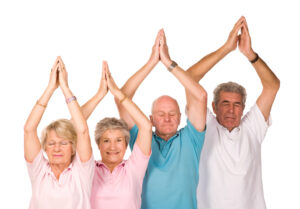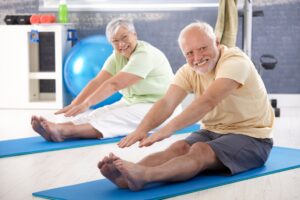
There is a new generation of fitness aficionados – the super fit seniors.
And their message is clear. As we get older there is no reason why we should be less fit.
Health and fitness professionals across the fitness industry agree with the super fit seniors. It makes social and economic sense for people to stay as active and fit as they can into their old age.
Benefits of staying active
Firstly, there is the simple fact that leading an active life will keep the muscles strong, the bones healthier – and less prone to breakages – and the heart and lungs fitter.
Then there is the social impact. If an older person is going to fitness classes or joining others for a run, a bike or a swim, then they are getting all the mental health benefits that comes with a healthy social life. There is also the heightened levels of self confidence among super fit seniors.
These are just two of the huge number of benefits of leading an active life, whatever the age. The impact on society, again just a few among many, is a lowered demand on health services, less mental health issues, fewer cases of depression and loneliness.
This is a very simplistic summary of many complex issues, but the benefits of a healthy later life are unquestionable.
Walking the walk
It seems that the message is getting through. Sport England says the biggest rise in people doing fitness activities is among women over 60. According to the healthcare charity Nuffield Health, 60-plus gym members put in more time in the gym than any other age group, averaging eight sessions a week.
And these are not gentle classes involving a few moves and lots of stretching, these super-60s are doing high intensity, tough training workouts.
Super fit seniors set new bar
For this generation of exercise addicts, the standard advice and guidelines that suggest 2.5 hours of gentle exercise a week are just laughable. Take a look at the starter list for any cycle enduro, marathon or triathlon and you will find a large number of competitors who are well into their 60s.
What these super men and women have realised is that age is no barrier to activity. Just because the body clock is ticking, doesn’t mean you have to call time on exercise.
If you don’t use it, you lose it
It’s a universal truth that, when it comes to fitness, if you don’t use it, you lose it. The less active you are, the faster stamina fades. After 45, adults will begin to lose muscle and gain fat. That is why you need to exercise – to combat that ageing process. The more you maintain stamina with strength training and aerobic exercise, the more you will also maintain muscle, feel increased levels of energy and reduce your risk of developing chronic illness.
With exercise, the more you do, the more you are able to do. When you exercise regularly and push your limits, your body will respond by rebuilding, regenerating and making you stronger. The more you ask of your body, the more every cell will rise to the occasion. The cardiovascular system will deliver more blood to your muscles, your heart will recover quickly after exercise and your muscles will develop more vessels to process the blood and oxygen. Muscles will also become more efficient at burning fat and storing glycogen, so you can work harder and longer without tiring.
Exercise for everyone
The good news is that anyone can start to exercise, at any age. Whether you stopped sport when you left education and haven’t so much as run for a bus for 20 years, or if you are a retired rugby player who thought the knocks you took on the field had ended your sporting life – you can still go back to exercise and an active life.
It is very important you get a health check first. Once you have the all-clear to get active, visit Kelsey Kerridge and chat to one of our personal training team. They will be able to set you up on a programme that will get you as active as you want to be. Your goal could be anything from walking five miles a day or thrashing out a 20-mile open water swim!
Steps to fitness
• Assess your current level of stamina. Knowing where you are helps you know where to begin. This in turn lowers your risk of getting injured and quitting. Talk to your doctor before you embark on a new fitness programme. Consider getting a V02-max or other fitness assessment. Speak to the staff at Outlooks Gym for further advice.
• Strength train. Regularly lift something in a way that gets your heart pumping. Try a mix of free weights, kettlebells, weight machines or your own body weight.
• Customise. Work with a trainer to create a fitness program that specifically addresses your favourite sports activities and personal health concerns. Then get out and play, ride a bike, join a running club or a five-a-side football team.
• Eat and drink right. Your weight training will progress faster and better if you give your body the fuel and water it needs — before, during and after exercise.








